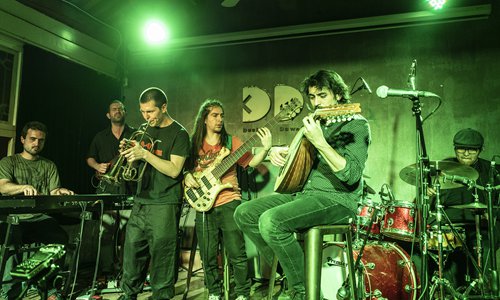HOME >> ARTS
Jazz enjoying a comeback in major metropolises in China
By Bi Mengying Source:Global Times Published: 2019/5/28 18:13:40
Jazz gaining ground throughout major metropolises in China

A young girl swayed to the music while sitting at her seat in the front row of the small live house hidden in a Beijing alleyway. The venue was packed with Chinese and foreigners who had come to listen to this band from Chile give a performance of a genre that has been enjoying something of a comeback in China: jazz.
"Jazz is about expressing emotions, the sensitive temperament in a very sensitive way… It is like a way to get your emotions out, and it is basically the root of all modern music," Ruth Koleva, a Bulgarian jazz and folk singer who recently performed at the live house, told the Global Times.
Jazz accounts for about 30 percent of all performances at the Dusk and Dawn Club, or DDC, according to the owner Zhang Jincan. While this may not seem very large, it is considering that this type of music was once condemned as huangse yinyue, or obscene music, in China.
Jazz in China
The history of jazz in China can be traced back to Shanghai in the 1930s, when US trumpet player Buck Clayton and his band performed in the Canidrome, the city's famous, luxury ballroom. At the time in China, real US jazz was only performed in fancy ballrooms like the Canidrome, which were only accessible to top elites. This contributed to the development of a negative image toward the genre among the Chinese public due to the disparity of income in Shanghai.
"The poor reputation of Chinese jazz can be explained by the fact that this music was mainly played in cabarets and night-clubs - places associated with prostitution, drugs and alcohol. Jazz was automatically added to that list of sins," wrote Taavi Niinimaa in an article titled Shanghai's Golden Age of Jazz Music on GBTimes, an English website about China.
Things did not change until the early 1980s, after China's reform and opening-up, during which time Western music, jazz included, was re-introduced to the public.
Steady growth
In addition to DDC's jazz performances, jazz has been gaining ground in big cities in China such as Beijing. Some venues specifically dedicated to jazz have also sprung up. For instance, the East Shore Live Jazz Cafe, Jianghu Bar, Frank by Ala House number among the most familiar venues to jazz fans in Beijing.
Even New York's Blue Note Jazz Club, one of the world's most renowned jazz clubs, has seen the potential of the Chinese market, opening a branch in Beijing in 2016. According to a report from CNN, the club is targeting China's ever-growing middle class and overseas returnees by bringing in top-level international artists.
More than a hobby
Hao Yu, who studied in the US at a graduate school and has since returned to China to work at an architecture firm in Beijing, is part of this targeted demographic.
"I spend a lot of time at cafes since moving back to China, just like I used to do in the States. Instead of working on school tasks, I now work on projects from work. The cafes I visit play jazz in the background very often, which is something I really enjoy. I started to go to some live jazz performances when I was studying in the US, now my friends and I sometimes go to live houses together during the weekends. I wouldn't call it a hobby as I do not go to the performances that often, it is something closer to a habit that reminds me of my days in the States," she said.
In addition to cafes and live houses frequented by overseas returnees like Hao, jazz is often performed or played in the lobbies and fancy bars at luxury hotels in Beijing, where well-to-do entrepreneurs meet to discuss business. Fan Baile, vice president of Beijing-based media company Trends Media Group, is one of them.
"The middle-aged men around me all have some kinds of hobbies like listening to Peking Opera, tasting whisky or watching soccer. They all have something in common in that there is a lot to learn. I made jazz my hobby. There are so many different schools and styles, so many excellent pieces to appreciate. It's a hobby that I can dedicate myself to. I've listened to jazz for a couple of years, yet I still don't understand all the different schools and types. It's a hobby that motivates me to keep learning all the time," said Fan.
Despite the steady development of jazz in China, it remains a relatively niche market.
"Since I visit some venues so often, I have become friends with the owners and other visitors who are also jazz enthusiasts. Since the fan base isn't very large, I get to make friends with some of the musicians and some have become my close friends, like family. That is the charismas of jazz for me - it makes me feel like more than a listener," said Fan.
Newspaper headline: Return to form